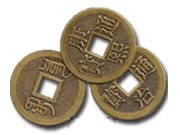
I Ching
The I Ching, also known as the Classic of Changes or Book of Changes, is one of the most influential and complex ancient literary masterpieces of the Far East, the essence of Chinese spirituality, yet retaining its mystery and wisdom throughout the millenia. Far from being a mere oracle, the I Ching amounts the classical knowledge of ancient Chinese dynasties and helps those in search of answers to learn how to balance their rhythm, adjust their behavior and deepen their understanding in order to harmoniously attune themselves to the mechanism of the Universe which, akin to human nature, is perpetually changing.
The underlying principles of this divination text are attributed to Fu Xi, a legendary emperor (around 2953 - 2838 BCE), to whom the symbolic representations of cosmological phenomena, energy flow and metamorphosis, the eight trigrams were divulged supernaturally. Based on the interaction between Yin and Yang, these trigrams serve as a basis for "the arrangement" of the 64 hexagrams of the Book of Changes.
According to Chinese cosmogony, Qi is synonymous with the Origin of Things, also known as the Infinity or Nonexistence from which the Existence, Tai Qi, evolved. Tai Qi comprises two primordial forces, Yin and Yang, the interaction of which formed the "Ten Thousand Things", that is to say, all of which Creation is comprised.
Yang is the masculine, positive and active principle, corresponding to Heaven. It is associated with light, warmth, brightness and outwardness whereas Yin is the feminine, negative, passive principle representing Earth. It is characterized by coolness, darkness, indwardness and intimacy. Functioning as complementary forces, the two principles cannot exist without one another and together they form the dynamic infrastructure of the Universe which, by its perpetual transformations, seeks to strike a balance between these opposing forms of energy.

The Hexagrams
Hexagrams are figures composed of six stacked horizontal lines, where each line is either Yin (a broken line _ _ ), or Yang (a solid line ___) . Bearing a specific name, each hexagram is accompanied with a general description, the Symbolism which reflects the images of the trigrams (Heaven, Earth, Water, Thunder, Mountain, Wind, Fire and Lake), and the Context. The latter consists of the judgement ascribed by king Wen to the hexagram while he was incarcerated. His son, the Duke of Chou, went further into detail and wrote commentaries on each line. King Wen (1152 - 1056 BCE) is said to have arranged the 8 trigrams in pairs, thus creating the 64 hexagrams of the I Ching.
Later on, Confucius too contributed to the composition of the I Ching, thus giving weight to this divination text.
Either the 50 yarrow stalks or the 3 coins are used in order to consult the Classic of Changes. The traditional method involves the manipulation of several yarrow stalks that symbolize the Universe. Firstly, these fifty stalks are divided into two heaps and after the stalks are counted off, a Yin or Yang pattern emerges. However, the three-coin method is the newest and most popular technique. The querent must firstly decide which one of the sides is Yin and which is Yang, then clench the coins in his/her fist, focus on the question and eventually cast them on the table. Afterwards, the coins are checked so as to see which ones are directed upwards. The Yin sides are worth 2 points while the Yang sides are assigned 3 points. After their values are added up, the sum total corresponds to the first line of the hexagram. This process is repeated 5 more times, working one’s way from the bottom up to the sixth line. If 3 Yang sides are obtained after the coins are tossed, they produce a total of 9 points that amounts to a changing Yang line while 3 Yin sides add up to 6 points that amount to a changing Yin line. A sum total of 7 points is equivalent to a Yang line whereas 8 points count as a Yin line. The changing Yin line becomes a Yang line and the changing Yang line becomes a Yin line. Thus, a new hexagram emerges which must also be consulted in the interpretation.
This whole procedure may seem rather overwhelming to some of you. Therefore, we invite you to consult the I Ching oracle for free on our website. But first of all, take some time to clear your mind, listen to some relaxing music and focus solely on the issue that troubles you. When you feel ready for the oracle’s answer, click the Cast button. Please do not refresh the page if you aren’t satisfied with the result. Even though you may not like what the oracle has to say about your question, please remember that the first answer you receive is the one that truly reflects your situation.
You must also bear in mind the fact that the I Ching does not answer yes-no questions. Its true purpose is to unravel the intricacies of the issue that troubles you and to guide you through the process of managing and solving it.
AstroFidelia - Astrology, Horoscope, Zodiac, Numerology, Divination, Tarot, I Ching

